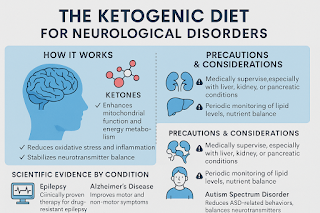The ketogenic diet (KD), a high-fat, low-carbohydrate, and moderate-protein nutritional approach, has long been recognized for its profound effects on brain health. Originally developed in the 1920s as a treatment for epilepsy, the diet has now gained attention for its potential benefits in a range of neurological disorders, including Alzheimer's disease, Parkinson's disease, multiple sclerosis (MS), autism spectrum disorder (ASD), and even migraine and traumatic brain injury.
How It Works: The Brain on Ketones
Under normal dietary conditions, the brain primarily uses glucose for fuel. However, during ketosis—triggered by a ketogenic diet—the body begins producing ketone bodies (β-hydroxybutyrate, acetoacetate), which cross the blood-brain barrier and provide an alternative, efficient energy source for neurons.
Ketones have been shown to:
- Enhance mitochondrial function and energy metabolism
- Reduce oxidative stress and inflammation
- Stabilize neurotransmitter balance, especially GABA and glutamate
- Improve synaptic plasticity and brain signaling
Scientific Evidence by Condition
Epilepsy:
KD is a clinically proven therapy for drug-resistant epilepsy, especially in
children. Studies show a 50–90% reduction in seizures among compliant patients.
Alzheimer’s Disease:
Early research suggests ketones may bypass insulin resistance in the brain
(often referred to as "type 3 diabetes") and provide neuroprotection.
A 2019 study published in Frontiers in Aging Neuroscience reported
improved memory performance in patients on a ketogenic intervention.
Parkinson’s Disease:
A small clinical trial (Phillips et al., 2018) demonstrated motor and non-motor
symptom improvement in PD patients following a ketogenic diet compared to a
low-fat diet.
Multiple Sclerosis (MS):
Emerging evidence shows KD can reduce inflammatory markers and improve fatigue
and quality of life in MS patients. A 2022 study in Cell Reports
revealed KD altered gut microbiota beneficially, reducing autoimmune responses.
Autism Spectrum Disorder (ASD):
Animal studies and limited human trials suggest KD may reduce ASD-related
behaviors by balancing neurotransmitters and reducing neuroinflammation.
Precautions & Considerations
While promising, the ketogenic diet isn't for everyone. It must be medically supervised, especially for individuals with liver, kidney, or pancreatic conditions. Long-term adherence may also affect lipid levels and nutrient balance, so periodic monitoring is essential.
The ketogenic diet offers neuroprotective, anti-inflammatory, and metabolic benefits that are deeply relevant to neurological disorders. While more large-scale human trials are needed, current evidence is compelling enough to consider KD a powerful complementary intervention in neurotherapy—with expert guidance.





No comments:
Post a Comment